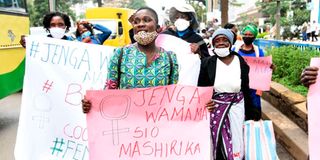It’s time for women, girls to challenge the new normal

Women working in informal sector demonstrate on Kenyatta Avenue, Nairobi last year. They demanded for Covid-19 stimulus packages for women from the Government. Globally, more women have been adversely affected by the pandemic.
What you need to know:
- Globally, more women and girls by the nature of their gender have been adversely affected by Covid-19.
- Across the world, women are facing increased domestic violence, unpaid care duties, unemployment and poverty.
- Women leaders within government, civil society, religious and educational institutions can bring a whole lot of change through policy, laws and actions.
Themed “Women in leadership: Achieving an equal future in a Covid-19 World” this year’s International Women’s Day came at the backdrop of new challenges for women and girls across the globe that have been accelerated by Covid-19 pandemic.
Globally, more women and girls by the nature of their gender have been adversely affected by Covid-19. The stark reality is that the dire effects of Covid-19 on women in 2020 seemed to have spilled to 2021 and might be here with us, for longer.
With the prolonged school closures in Kenya, 2020 saw a good number of teenage pregnancies. In 2021, we are seeing more of teenage girls who are faced with the dilemma of whether to fend for their babies or to stay in school. A harsh reality.
More so, most of the jobs whose operations were seriously affected due to Covid-19 restrictions and preventive measures are those that employ a good number of women. These include the hospitality and tourism sectors, schools, small and medium enterprises (SMES) and such others.
Increased domestic violence
In addition to the persistent pre-existing social and systemic barriers to women’s participation and leadership, new barriers have emerged with the Covid-19 pandemic.
Across the world, women are facing increased domestic violence, unpaid care duties, unemployment and poverty. Despite women making up a majority of front-line workers, there is limited representation of women in national and global Covid-19 policy spaces.
On a global scale, this situation has eroded most of the gains made in the last 25 years since the Declaration of the Beijing Platform for Action in the push for gender equality and the advancement of women in the society. This, should not be the case. It is time to take action.
It is against this challenging reality that the world is celebrating women's achievements, and increasing visibility, while calling out inequality and bias to widen more spaces for women to thrive.
The UN-Women appreciates that women leaders and women’s organisations have demonstrated their skills, knowledge and networks to effectively lead in Covid-19 response and recovery efforts.
Today, there is more acceptance than ever before that women bring different experiences, perspectives and skills to the table, and are influential in shaping policies that work better for all.
Socio-economic potential
IWD 2021 recognised the special role women in leadership positions can play in challenging the current situation and bringing out a change. The adverse effects of Covid-19 are not the new normal for women and girls, it is time to challenge the status quo and take action against inequalities that bar women from actualising their full socio-economic potential.
Women leaders within government, civil society, religious and educational institutions can bring a whole lot of change through policy, laws and actions. Grassroots women who have been shoved to the edges by the effects of Covid-19 desire for a change.
With the right policies in place, laws, procedures and actions; women leaders can transform the society.
Deter sex pests
There is still a need to push for more inclusive workplaces with more women taking leadership roles, and lesser women leaving their jobs. The need to not only accept teenage mothers back to school, but to support them to attain the highest standards of education possible, push for policies, tougher laws and procedures that will deter sex pests from preying on girls.
In Kenya, more and more women have sunk into poverty – a to-year low – since Covid-19 was declared a national disaster by the government. There is need for socio-economic empowerment of women and girls on a broader scale.
Women and girls need to get back into their businesses and jobs. The empowerment of women will make them more resilient to economic shocks, have a better outlook towards life and record better outcomes for their families and children.
This will ultimately transform the society socio-economically and in a sustainable manner.





